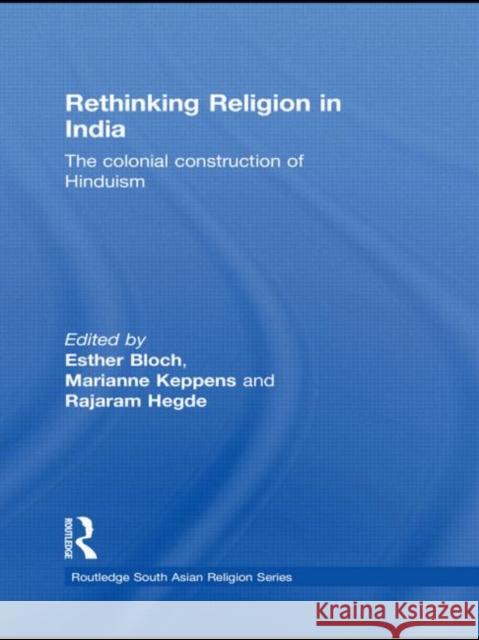Rethinking Religion in India: The Colonial Construction of Hinduism » książka
Rethinking Religion in India: The Colonial Construction of Hinduism
ISBN-13: 9780415548908 / Angielski / Twarda / 2010 / 192 str.
Rethinking Religion in India: The Colonial Construction of Hinduism
ISBN-13: 9780415548908 / Angielski / Twarda / 2010 / 192 str.
(netto: 788,12 VAT: 5%)
Najniższa cena z 30 dni: 755,61
ok. 16-18 dni roboczych.
Darmowa dostawa!
This book critically assesses recent debates about the colonial construction of Hinduism. Increasingly scholars have come to realise that the dominant understanding of Indian culture and its traditions is unsatisfactory. According to the classical paradigm, Hindu traditions are conceptualized as features of a religion with distinct beliefs, doctrines, sacred laws and holy texts. Today, however, many academics consider this conception to be a colonial 'construction'. This book focuses on the different versions, arguments and counter-arguments of the thesis that the Hindu religion is a construct of colonialism. Bringing together the different positions in the debate, it provides necessary historical data, arguments and conceptual tools to examine the argument. Organized in two parts, the first half of the book provides new analyses of historical and empirical data; the second presents some of the theoretical questions that have emerged from the debate on the construction of Hinduism. Where some of the contributors argue that Hinduism was created as a result of a western Christian notion of religion and the imperatives of British colonialism, others show that this religion already existed in pre-colonial India; and as an alternative to these standpoints, other writers argue that Hinduism only exists in the European experience and does not correspond to any empirical reality in India. This volume offers new insights into the nature of the construction of religion in India and will be of interest to scholars of the History of Religion, Asian Religion, Postcolonial and South Asian Studies.
This book critically assesses recent debates about the colonial construction of Hinduism. In the current paradigm, the Hindu traditions are conceptualized as a religion characterized by distinct beliefs, doctrines, sacred laws and holy texts. However, many scholars have started arguing that this conception is a colonial ‘construction,’ which does not correspond to any empirical reality of ‘Hinduism.’ Others have shown that conceptions of ‘Hinduism’ very similar to those of the British colonials were in existence long before the nineteenth century. This book focuses on the different versions, arguments and counter-arguments of the thesis that the Hindu religion is a construct of colonialism. In one continuous dialogue that generates new insights and arguments, it brings together the different positions in the debate. Organized in two parts, the chapters, written by experts in their field, put forward historical and empirical arguments as well as theoretical reflections. Thereby the theoretical questions on the construction of Hinduism are identified which have so far remained unanswered. The book presents new or improved insights into the nature of the construction of religion in India and will be of interest to scholars of the History of Religion, Asian Religion, Postcolonial and South Asian Studies.











